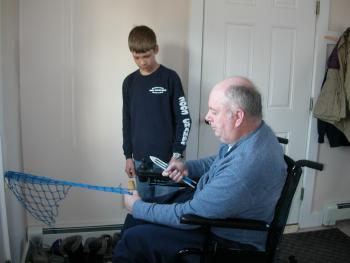John Neubig

Finding Friendship Oral History Project
The Finding Friendship Oral History Project is a joint effort of the Friendship Museum and the Friendship Village School, directed by Sally Merrick, museum volunteer, and Gaylea Hynd, teacher. In 2003-2004 sixth grade students conducted taped interviews of three generations of lobstermen and women, as well as others associated with the lobstering industry. Printed copies of the interviews and CDs of the printed transcripts are available at the Friendship Museum in Friendship, Maine.
Eleanor Barlow
John Neubig, also known as Johnny, was born on September 18, 1939, and has spent his entire life in Friendship. His family has lived in Friendship for two generations Johnny has one sister, two sons, and a grandson. Although he is currently disabled, he spent 31 years as a lobsterman, from 1954 to 1985.As a lobsterman, Johnny captained his own boat, and in the later years, his wife accompanied him on the fishing trips. In addition to lobstering, he worked as a mason and served in the Navy for two years. Johnny's hobbies include stamp collecting, hunting, and building boat models from scratch.
Scope and Content Note
Johnny describes his life as a lobsterman and how the equipment has changed over the years. His boat, named "The Three D's," was a tribute to his father, David, and Dwayne. On board, he carried various equipment such as a fathometer, fire extinguishers, and a radiotelephone. Johnny would leave home around 5:00 in the morning, return by 2:00 in the afternoon, and cover about six miles per day while hauling 200 traps. He describes the regulations surrounding lobsters, such as size requirements and the notching process to distinguish females with eggs. Johnny also mentions catching various other fish species in his traps, including flounders, mackerel, pollock, and codfish. At the end of the day, he would take his lobsters to a local wharf, and the price he received was determined by market demand. Reflecting on his lobstering career, Johnny noted that a good haul in those days amounted to around 100 pounds, but he could catch 200-250 pounds during the fall. Weather conditions, particularly rough seas, affected his fishing schedule. Over time, he observed significant changes in the lobstering industry, including the shift from wooden to wire traps and the increase in the number of traps used. Despite the challenges, Johnny cherished the fresh air and the beauty of watching the sunrise while lobstering. His least favorite aspect was dealing with storms that tangled his traps or falling overboard. He recounts a memorable incident when he fell overboard near Black Island but was quickly rescued by a fellow fisherman. In winter, Johnny lobstered until Christmas, and afterward, he worked with his father in masonry.
Please Note: The oral histories in this collection are protected by copyright and have been created for educational, research and personal use as described by the Fair Use Doctrine in the U.S. Copyright law. Please reach out Voices@noaa.gov to let us know how these interviews are being used in your research, project, exhibit, etc. The Voices staff can help provide other useful resources related to your inquiry.
The NOAA mission is to understand and predict changes in climate, weather, oceans, and coasts, to share that knowledge and information with others, and to conserve and manage coastal and marine ecosystems and resources. The Voices Oral History Archives offers public access to a wide range of accounts, including historical materials that are products of their particular times, and may contain offensive language or negative stereotypes.
Voices Oral History Archives does not verify the accuracy of materials submitted to us. The opinions expressed in the interviews are those of the interviewee only. The interviews here have been made available to the public only after the interviewer has confirmed that they have obtained consent.
